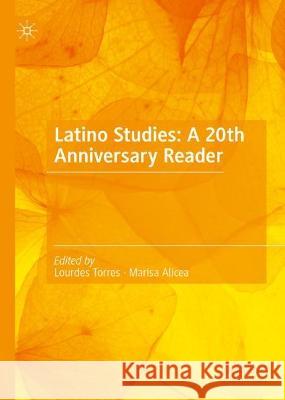Latino Studies: A 20th Anniversary Reader » książka



Latino Studies: A 20th Anniversary Reader
ISBN-13: 9783031377839 / Angielski
Latino Studies: A 20th Anniversary Reader
ISBN-13: 9783031377839 / Angielski
(netto: 616,28 VAT: 5%)
Najniższa cena z 30 dni: 578,30
ok. 16-18 dni roboczych.
Darmowa dostawa!
1. Introduction
Lourdes Torres is Professor of Latin American and Latino Studies at DePaul University. She is editor of Latino Studies and author of Puerto Rican Discourse: A Sociolinguistic Study of a New York Suburb. Her co-authored book Spanish in Chicago is forthcoming.
Marisa Alicea is Professor of Sociology and an affiliate faculty member of the Latin American and Latino Studies Department at DePaul University. She is co-author of Surviving Heroin: Interviews with Women in Methadone Clinics and co-editor of Migration and Immigration: A Global View. Marisa currently serves an associate editor of Latino Studies.
This book highlights cutting-edge articles published in the journal, Latino Studies, over the last two decades. It features the work of leading and emerging scholars whose innovative theoretical and conceptual contributions to Latinx studies have shaped scholarly debates in our interdisciplinary field and continue to have an impact. This collection embraces a broad range of topics organized in four sections representative of major themes in Latinx studies including: Latinidades/Identidades, Race/Racialization, Migration/Immigration, and Legality/Citizenship/Belonging. Latino Studies: A 20th Year Anniversary Reader will be an indispensable resource for students and scholars looking for a robust interdisciplinary introduction to Latinx studies, the pivotal issues and debates that have shaped the field over the recent past, and directions for future research.
Lourdes Torres is Professor of Latin American and Latino Studies at DePaul University. She is editor of Latino Studies and author of Puerto Rican Discourse: A Sociolinguistic Study of a New York Suburb. Her co-authored book Spanish in Chicago is forthcoming.
Marisa Alicea is Professor of Sociology and an affiliate faculty member of the Latin American and Latino Studies Department at DePaul University. She is co-author of Surviving Heroin: Interviews with Women in Methadone Clinics and co-editor of Migration and Immigration: A Global View. Marisa currently serves an associate editor of Latino Studies.
1997-2026 DolnySlask.com Agencja Internetowa
KrainaKsiazek.PL - Księgarnia Internetowa









